Form DFAN14A KANSAS CITY SOUTHERN Filed by: CANADIAN PACIFIC RAILWAY LTD/CN
UNITED STATES
SECURITIES AND EXCHANGE COMMISSION
Washington, D.C. 20549
SCHEDULE 14A
Proxy Statement Pursuant to Section 14(a) of
the Securities Exchange Act of 1934
Filed by the Registrant ☐
Filed by a Party other than the Registrant ☒
Check the appropriate box:
| ☐ | Preliminary Proxy Statement | |
| ☐ | Confidential, for Use of the Commission Only (as permitted by Rule 14a-6(e)(2)) | |
| ☐ | Definitive Proxy Statement | |
| ☐ | Definitive Additional Materials | |
| ☒ | Soliciting Material under §240.14a-12 | |
KANSAS CITY SOUTHERN
(Name of Registrant as Specified In Its Charter)
CANADIAN PACIFIC RAILWAY LIMITED
(Name of Person(s) Filing Proxy Statement, if other than the Registrant)
Payment of Filing Fee (Check the appropriate box):
| ☒ | No fee required. | |||
| ☐ | Fee computed on table below per Exchange Act Rules 14a-6(i)(1) and 0-11. | |||
| (1) | Title of each class of securities to which transaction applies: | |||
| (2) | Aggregate number of securities to which transaction applies: | |||
| (3) | Per unit price or other underlying value of transaction computed pursuant to Exchange Act Rule 0-11 (set forth the amount on which the filing fee is calculated and state how it was determined): | |||
| (4) | Proposed maximum aggregate value of transaction: | |||
| (5) | Total fee paid: | |||
| ☐ | Fee paid previously with preliminary materials. | |||
| ☐ | Check box if any part of the fee is offset as provided by Exchange Act Rule 0-11(a)(2) and identify the filing for which the offsetting fee was paid previously. Identify the previous filing by registration statement number, or the Form or Schedule and the date of its filing. | |||
| (1) | Amount Previously Paid: | |||
| (2) | Form, Schedule or Registration Statement No.: | |||
| (3) | Filing Party: | |||
| (4) | Date Filed: | |||
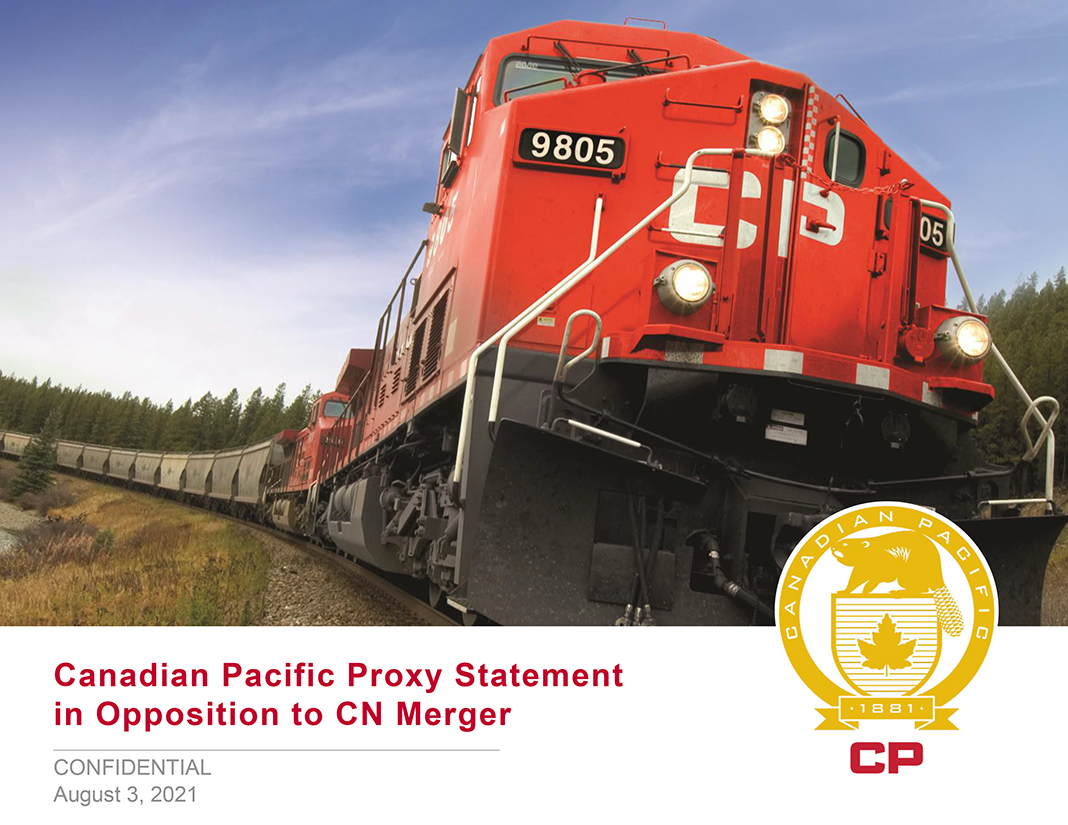
Canadian Pacific Proxy Statement
in Opposition to
CN Merger
CONFIDENTIAL
August 3, 2021
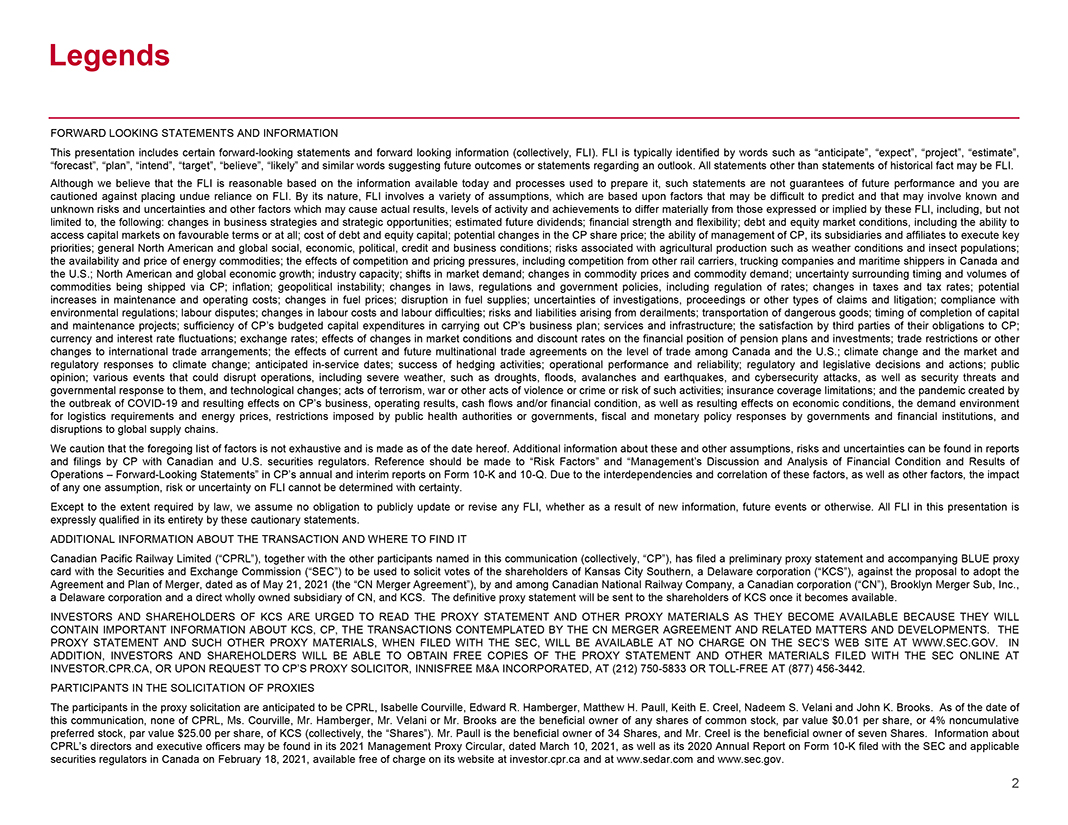
Legends
FORWARD LOOKING STATEMENTS AND INFORMATION
This presentation includes certain forward-looking statements and forward looking information (collectively, FLI). FLI is typically identified by words such as
“anticipate”, “expect”, “project”, “estimate”, “forecast”, “plan”, “intend”, “target”, “believe”, “likely” and similar words suggesting future
outcomes or statements regarding an outlook. All statements other than statements of historical fact may be FLI. Although we believe that the FLI is reasonable based on the information available today and processes used to prepare it, such
statements are not guarantees of future performance and you are cautioned against placing undue reliance on FLI. By its nature, FLI involves a variety of assumptions, which are based upon factors that may be difficult to predict and that may involve
known and unknown risks and uncertainties and other factors which may cause actual results, levels of activity and achievements to differ materially from those expressed or implied by these FLI, including, but not limited to, the following: changes
in business strategies and strategic opportunities; estimated future dividends; financial strength and flexibility; debt and equity market conditions, including the ability to access capital markets on favourable terms or at all; cost of debt and
equity capital; potential changes in the CP share price; the ability of management of CP, its subsidiaries and affiliates to execute key priorities; general North American and global social, economic, political, credit and business conditions; risks
associated with agricultural production such as weather conditions and insect populations; the availability and price of energy commodities; the effects of competition and pricing pressures, including competition from other rail carriers, trucking
companies and maritime shippers in Canada and the U.S.; North American and global economic growth; industry capacity; shifts in market demand; changes in commodity prices and commodity demand; uncertainty surrounding timing and volumes of
commodities being shipped via CP; inflation; geopolitical instability; changes in laws, regulations and government policies, including regulation of rates; changes in taxes and tax rates; potential increases in maintenance and operating costs;
changes in fuel prices; disruption in fuel supplies; uncertainties of investigations, proceedings or other types of claims and litigation; compliance with environmental regulations; labour disputes; changes in labour costs and labour difficulties;
risks and liabilities arising from derailments; transportation of dangerous goods; timing of completion of capital and maintenance projects; sufficiency of CP’s budgeted capital expenditures in carrying out CP’s business plan; services and
infrastructure; the satisfaction by third parties of their obligations to CP; currency and interest rate fluctuations; exchange rates; effects of changes in market conditions and discount rates on the financial position of pension plans and
investments; trade restrictions or other changes to international trade arrangements; the effects of current and future multinational trade agreements on the level of trade among Canada and the U.S.; climate change and the market and regulatory
responses to climate change; anticipated in-service dates; success of hedging activities; operational performance and reliability; regulatory and legislative decisions and actions; public opinion; various
events that could disrupt operations, including severe weather, such as droughts, floods, avalanches and earthquakes, and cybersecurity attacks, as well as security threats and governmental response to them, and technological changes; acts of
terrorism, war or other acts of violence or crime or risk of such activities; insurance coverage limitations; and the pandemic created by the outbreak of COVID-19 and resulting effects on CP’s business,
operating results, cash flows and/or financial condition, as well as resulting effects on economic conditions, the demand environment for logistics requirements and energy prices, restrictions imposed by public health authorities or governments,
fiscal and monetary policy responses by governments and financial institutions, and disruptions to global supply chains.
We caution that the foregoing list of
factors is not exhaustive and is made as of the date hereof. Additional information about these and other assumptions, risks and uncertainties can be found in reports and filings by CP with Canadian and U.S. securities regulators. Reference should
be made to “Risk Factors” and “Management’s Discussion and Analysis of Financial Condition and Results of Operations – Forward-Looking Statements” in CP’s annual and interim reports on Form 10-K and 10-Q. Due to the interdependencies and correlation of these factors, as well as other factors, the impact of any one assumption, risk or uncertainty on FLI cannot be
determined with certainty.
Except to the extent required by law, we assume no obligation to publicly update or revise any FLI, whether as a result of new
information, future events or otherwise. All FLI in this presentation is expressly qualified in its entirety by these cautionary statements.
ADDITIONAL INFORMATION
ABOUT THE TRANSACTION AND WHERE TO FIND IT
Canadian Pacific Railway Limited (“CPRL”), together with the other participants named in this communication
(collectively, “CP”), has filed a preliminary proxy statement and accompanying BLUE proxy card with the Securities and Exchange Commission (“SEC”) to be used to solicit votes of the shareholders of Kansas City Southern, a
Delaware corporation (“KCS”), against the proposal to adopt the Agreement and Plan of Merger, dated as of May 21, 2021 (the “CN Merger Agreement”), by and among Canadian National Railway Company, a Canadian corporation
(“CN”), Brooklyn Merger Sub, Inc., a Delaware corporation and a direct wholly owned subsidiary of CN, and KCS. The definitive proxy statement will be sent to the shareholders of KCS once it becomes available.
INVESTORS AND SHAREHOLDERS OF KCS ARE URGED TO READ THE PROXY STATEMENT AND OTHER PROXY MATERIALS AS THEY BECOME AVAILABLE BECAUSE THEY WILL CONTAIN IMPORTANT INFORMATION ABOUT
KCS, CP, THE TRANSACTIONS CONTEMPLATED BY THE CN MERGER AGREEMENT AND RELATED MATTERS AND DEVELOPMENTS. THE PROXY STATEMENT AND SUCH OTHER PROXY MATERIALS, WHEN FILED WITH THE SEC, WILL BE AVAILABLE AT NO CHARGE ON THE SEC’S WEB SITE AT
WWW.SEC.GOV. IN ADDITION, INVESTORS AND SHAREHOLDERS WILL BE ABLE TO OBTAIN FREE COPIES OF THE PROXY STATEMENT AND OTHER MATERIALS FILED WITH THE SEC ONLINE AT INVESTOR.CPR.CA, OR UPON REQUEST TO CP’S PROXY SOLICITOR, INNISFREE M&A
INCORPORATED, AT (212) 750-5833 OR TOLL-FREE AT (877) 456-3442.
PARTICIPANTS IN THE
SOLICITATION OF PROXIES
The participants in the proxy solicitation are anticipated to be CPRL, Isabelle Courville, Edward R. Hamberger, Matthew H. Paull, Keith E.
Creel, Nadeem S. Velani and John K. Brooks. As of the date of this communication, none of CPRL, Ms. Courville, Mr. Hamberger, Mr. Velani or Mr. Brooks are the beneficial owner of any shares of common stock, par value $0.01 per
share, or 4% noncumulative preferred stock, par value $25.00 per share, of KCS (collectively, the “Shares”). Mr. Paull is the beneficial owner of 34 Shares, and Mr. Creel is the beneficial owner of seven Shares. Information about
CPRL’s directors and executive officers may be found in its 2021 Management Proxy Circular, dated March 10, 2021, as well as its 2020 Annual Report on Form 10-K filed with the SEC and applicable
securities regulators in Canada on February 18, 2021, available free of charge on its website at investor.cpr.ca and at www.sedar.com and www.sec.gov.
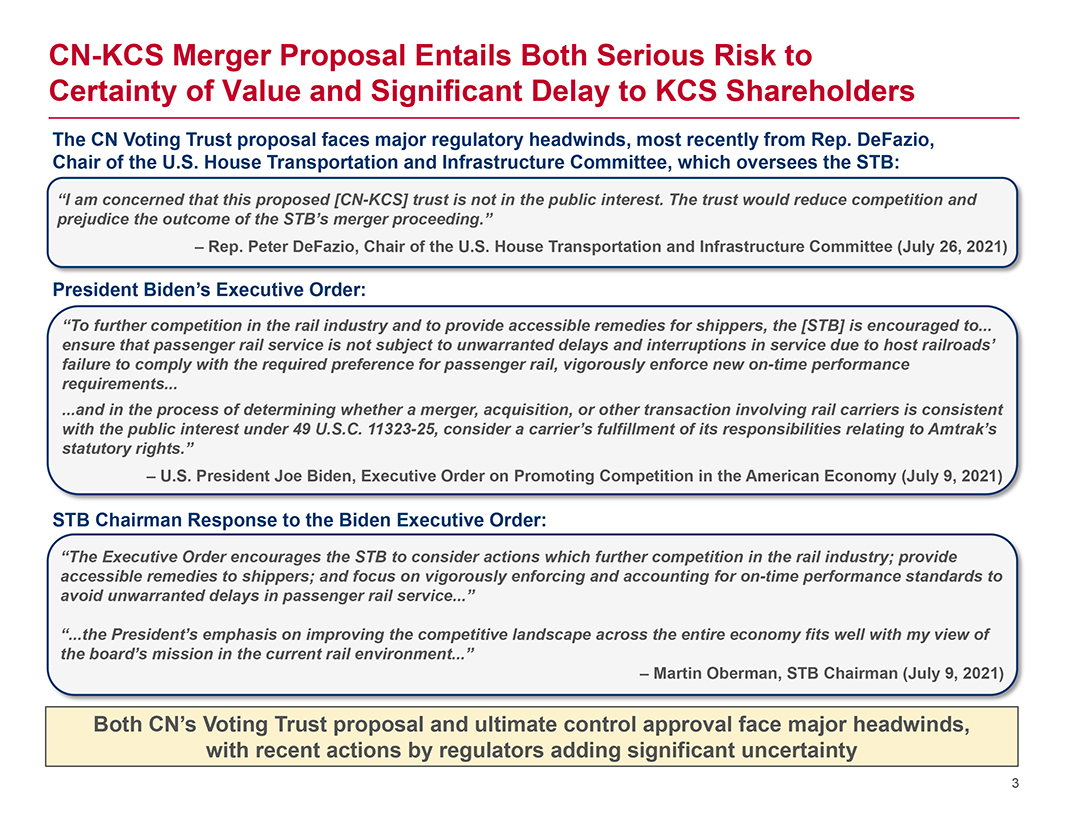
CN-KCS Merger Proposal Entails Both Serious Risk to Certainty of Value and Significant Delay to
KCS Shareholders
The CN Voting Trust proposal faces major regulatory headwinds, most recently from Rep. DeFazio, Chair of the U.S. House Transportation and
Infrastructure Committee, which oversees the STB:
“I am concerned that this proposed [CN-KCS] trust is not in the
public interest. The trust would reduce competition and prejudice the outcome of the STB’s merger proceeding.”
– Rep. Peter DeFazio, Chair of the
U.S. House Transportation and Infrastructure Committee (July 26, 2021)
President Biden’s Executive Order:
“To further competition in the rail industry and to provide accessible remedies for shippers, the [STB] is encouraged to ensure that passenger rail service is not subject to
unwarranted delays and interruptions in service due to host railroads’ failure to comply with the required preference for passenger rail, vigorously enforce new on-time performance requirements ...and in
the process of determining whether a merger, acquisition, or other transaction involving rail carriers is consistent with the public interest under 49 U.S.C. 11323-25, consider a carrier’s fulfillment of
its responsibilities relating to Amtrak’s statutory rights.”
– U.S. President Joe Biden, Executive Order on Promoting Competition in the American
Economy (July 9, 2021)
STB Chairman Response to the Biden Executive Order:
“The Executive Order encourages the STB to consider actions which further competition in the rail industry; provide accessible remedies to shippers; and focus
on vigorously enforcing and accounting for on-time performance standards to avoid unwarranted delays in passenger rail service...”
“...the President’s emphasis on improving the competitive landscape across the entire economy fits well with my view of the board’s mission in the current rail
environment...”
– Martin Oberman, STB Chairman (July 9, 2021)
Both
CN’s Voting Trust proposal and ultimate control approval face major headwinds, with recent actions by regulators adding significant uncertainty
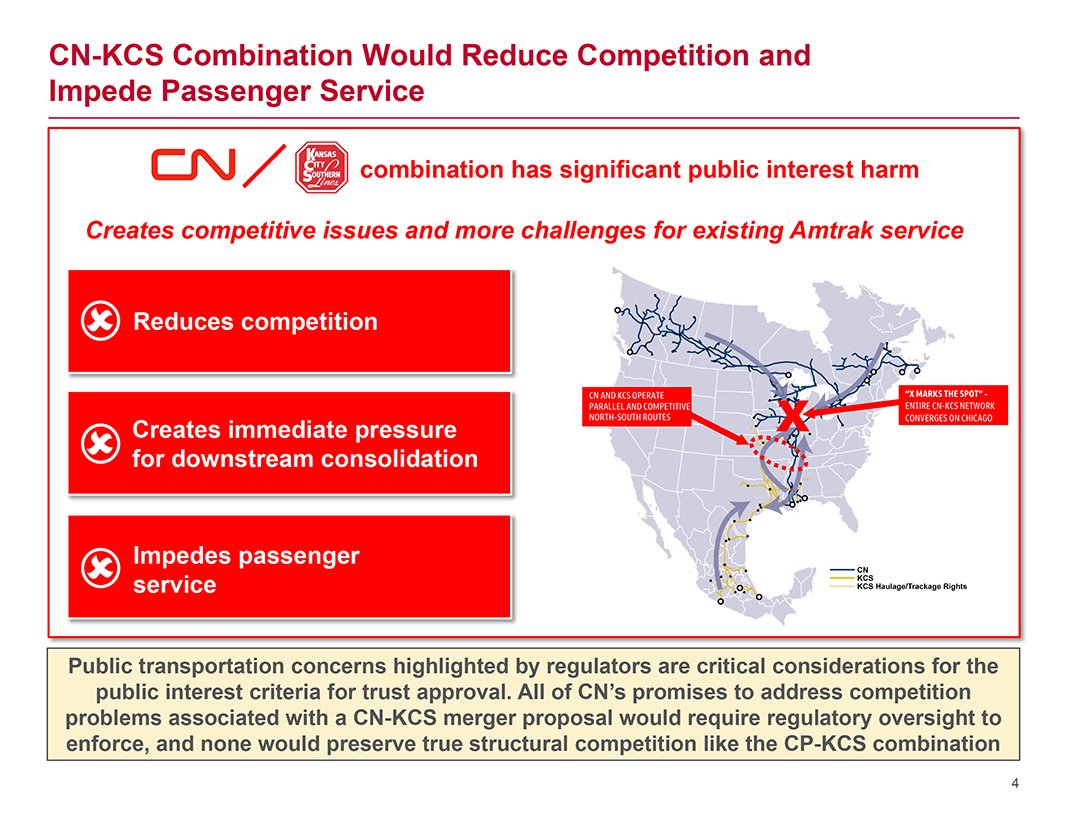
CN-KCS Combination Would Reduce Competition and Impede Passenger Service
combination has significant public interest harm
Creates competitive issues and more
challenges for existing Amtrak service
Reduces competition
Creates immediate
pressure for downstreaconsolidation
Impedes passenger service
CN AND KCS
OPERATE PARALLEL AND COMPETITIVE NORTH-SOUTH ROUTES
“X MARKS THE SPOT” -
ENTIRE CN-KCS NETWORK CONVERGES ON CHICAGO
-CN
-KCS
-KCS Haulage/Trackage Rights
Public transportation concerns highlighted by regulators are critical considerations for the public interest criteria for trust approval. All of CN’s promises to address
competition problems associated with a CN-KCS merger proposal would require regulatory oversight to enforce, and none would preserve true structural competition like the
CP-KCS combination
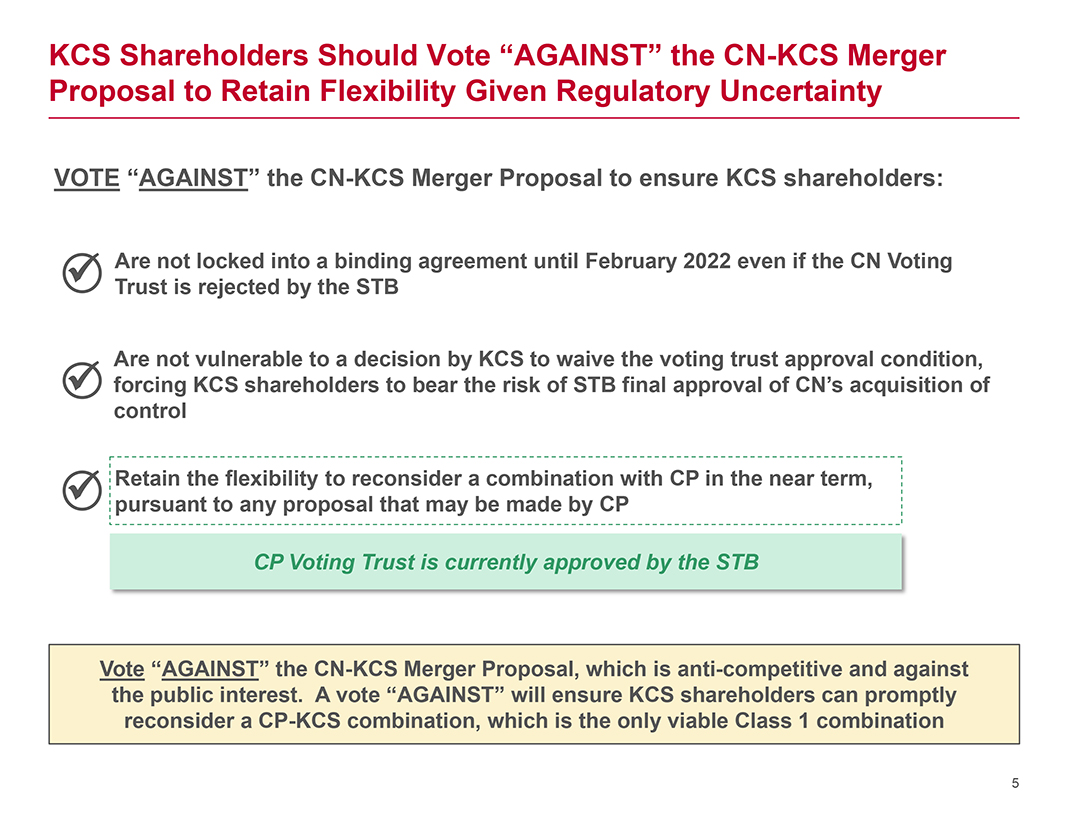
KCS Shareholders Should Vote “AGAINST” the CN-KCS Merger Proposal to Retain
Flexibility Given Regulatory Uncertainty
VOTE “AGAINST” the CN-KCS Merger Proposal to ensure KCS shareholders:
 Are not locked into a binding agreement until February 2022 even if the CN Voting Trust is rejected by the STB
Are not vulnerable to a decision by KCS to waive the voting trust approval condition, forcing KCS shareholders to bear the risk of STB final approval of CN’s acquisition of
control
 Retain the flexibility to reconsider a combination with CP in the near term, pursuant to any proposal that may be made by CP
CP Voting Trust is currently approved by the STB
Vote “AGAINST” the CN-KCS Merger Proposal, which is anti-competitive and against the public interest. A vote “AGAINST” will ensure KCS shareholders can promptly reconsider a CP-KCS
combination, which is the only viable Class 1 combination
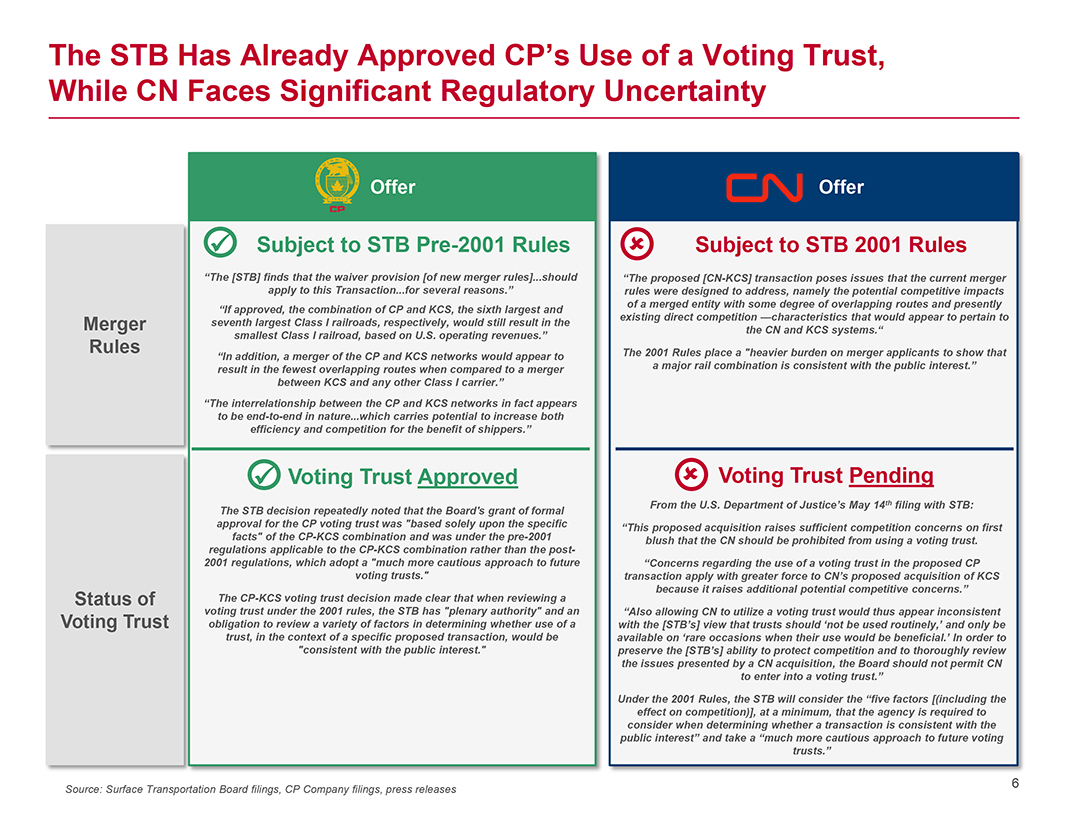
The STB Has Already Approved CP’s Use of a Voting Trust, While CN Faces Significant Regulatory Uncertainty
Offer
 Subject to STB Pre-2001 Rules
“The [STB] finds that the waiver provision [of new merger rules] should
apply to this Transaction for several reasons.”
“If approved, the
combination of CP and KCS, the sixth largest and
seventh largest Class I railroads, respectively, would still result in the
smallest Class I railroad, based on U.S. operating revenues.”
“In addition, a merger
of the CP and KCS networks would appear to
result in the fewest overlapping routes when compared to a merger
between KCS and any other Class I carrier.”
“The interrelationship between the CP
and KCS networks in fact appears
to be end-to-end in nature which carries potential
to increase both
efficiency and competition for the benefit of shippers.”
Merger Rules
 Voting Trust Approved
The STB decision repeatedly noted that the Board’s grant of formal
approval for the CP
voting trust was “based solely upon the specific
facts” of the CP-KCS combination and was under the pre-2001
regulations applicable to the CP-KCS combination rather than the post-
2001 regulations, which adopt a “much more cautious approach to future
voting trusts.”
The CP-KCS
voting trust decision made clear that when reviewing a
voting trust under the 2001 rules, the STB has “plenary authority” and an
obligation to review a variety of factors in determining whether use of a
trust, in the
context of a specific proposed transaction, would be
“consistent with the public interest.”
Status of Voting Trust
Offer
 Subject to STB 2001 Rules
“The proposed [CN-KCS] transaction poses issues that the current merger
rules were designed to address, namely the potential competitive
impacts
of a merged entity with some degree of overlapping routes and presently
existing direct competition —characteristics that would appear to pertain to
the CN and KCS systems.“
The 2001 Rules place a “heavier burden on merger applicants
to show that
a major rail combination is consistent with the public interest.”
 Voting Trust Pending
From the U.S. Department of Justice’s May 14th
filing with STB:
“This proposed acquisition raises sufficient competition concerns on first
blush that the CN should be prohibited from using a voting trust.
“Concerns regarding the
use of a voting trust in the proposed CP
transaction apply with greater force to CN’s proposed acquisition of KCS
because it raises additional potential competitive concerns.”
“Also allowing CN to
utilize a voting trust would thus appear inconsistent
with the [STB’s] view that trusts should ‘not be used routinely,’ and only be
available on ‘rare occasions when their use would be beneficial.’ In order to
preserve the [STB’s] ability to protect competition and to thoroughly review
the issues presented by a CN acquisition, the Board should not permit CN
to enter into a
voting trust.”
Under the 2001 Rules, the STB will consider the “five factors [(including the
effect on competition)], at a minimum, that the agency is required to
consider when
determining whether a transaction is consistent with the
public interest” and take a “much more cautious approach to future voting
trusts.”
Source: Surface Transportation Board filings, CP Company filings, press releases
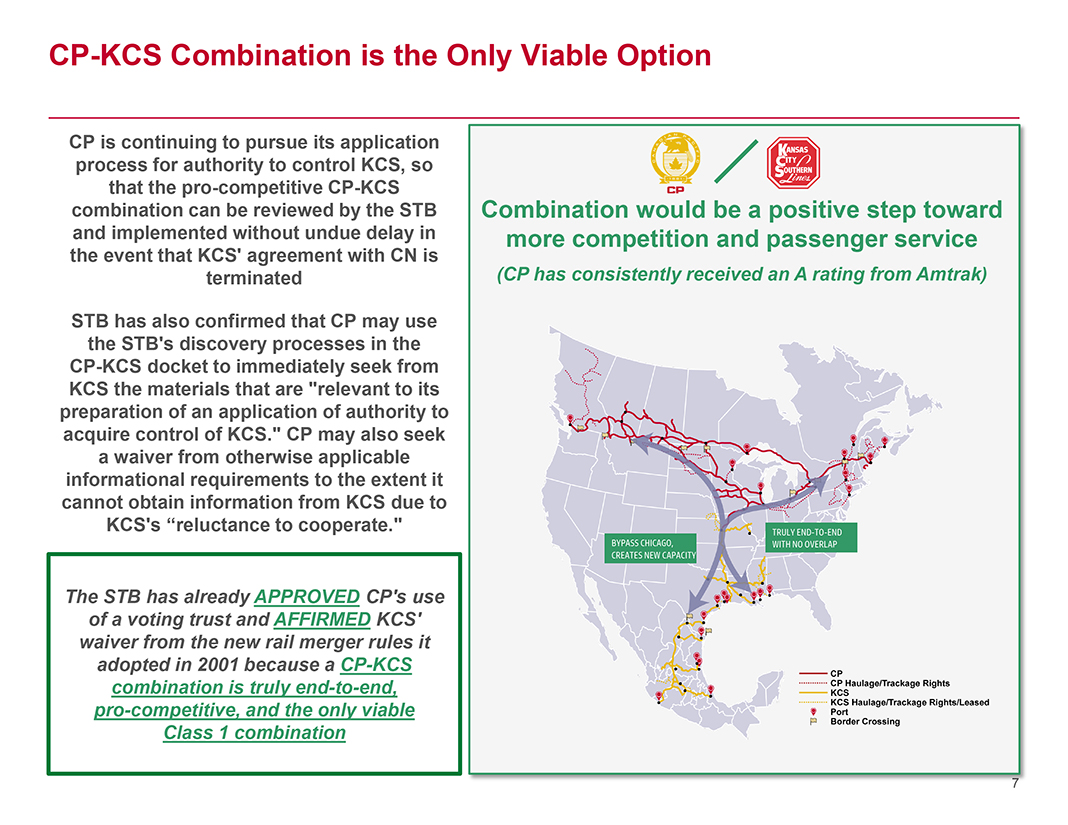
CP-KCS Combination is the Only Viable Option
CP is continuing to pursue its application process for authority to control KCS, so that the pro-competitive
CP-KCS combination can be reviewed by the STB and implemented without undue delay in the event that KCS’ agreement with CN is terminated
STB has also confirmed that CP may use the STB’s discovery processes in the CP-KCS docket to immediately seek from KCS the materials
that are “relevant to its preparation of an application of authority to acquire control of KCS.” CP may also seek a waiver from otherwise applicable informational requirements to the extent it cannot obtain information from KCS due to
KCS’s “reluctance to cooperate.”
The STB has already APPROVED CP’s use of a voting trust and AFFIRMED KCS’ waiver from the new rail merger
rules it adopted in 2001 because a CP-KCS combination is truly end-to-end,
pro-competitive, and the only viable Class 1 combination
Combination would be a positive step toward more competition
and passenger service
(CP has consistently received an A rating from Amtrak)
BYPASS CHICAGO, CREATES NEW CAPACITY
TRULY END-TO-END WITH NO OVERLAP
7
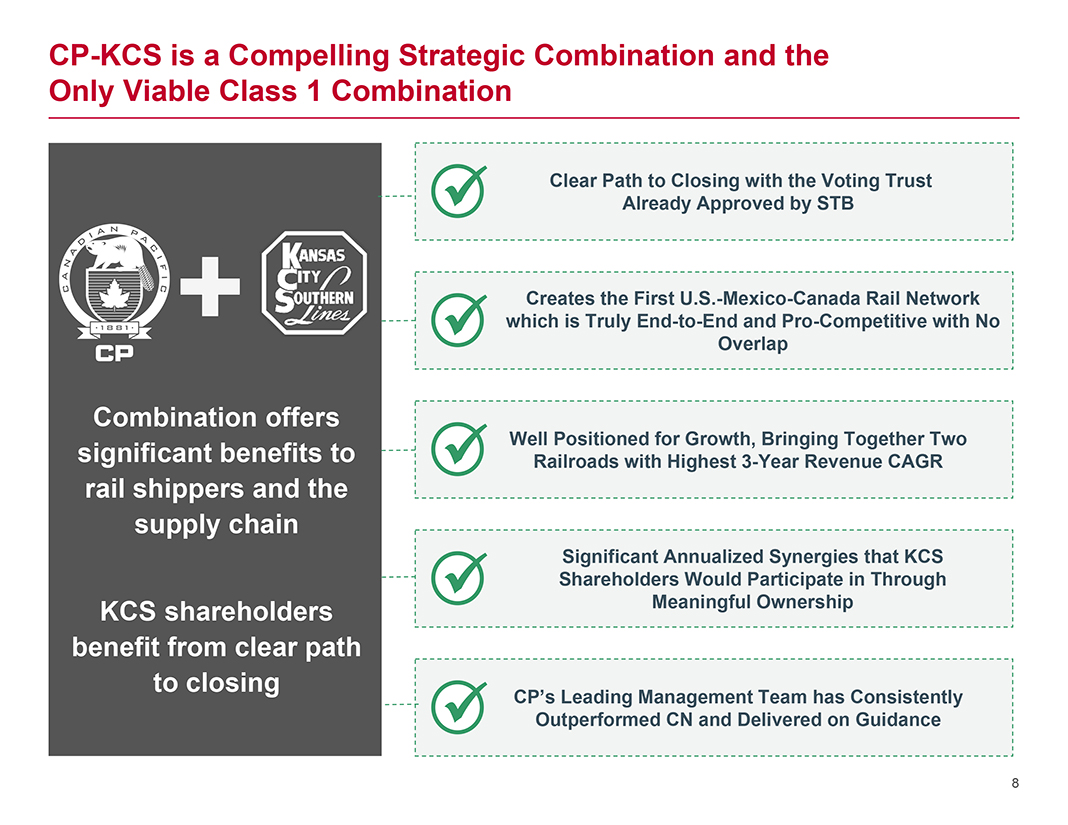
CP-KCS is a Compelling Strategic Combination and the Only Viable Class 1 Combination
Combination offers significant benefits to rail shippers and the supply chain
KCS shareholders benefit from clear path to closing
Clear Path to Closing
with the Voting Trust Already Approved by STB
Creates the First U.S.-Mexico-Canada Rail Network which is Truly End-to-End and Pro-Competitive with No Overlap
Well Positioned for Growth,
Bringing Together Two Railroads with Highest 3-Year Revenue CAGR
Significant Annualized Synergies that KCS Shareholders
Would Participate in Through Meaningful Ownership
CP’s Leading Management Team has Consistently Outperformed CN and Delivered on Guidance
8
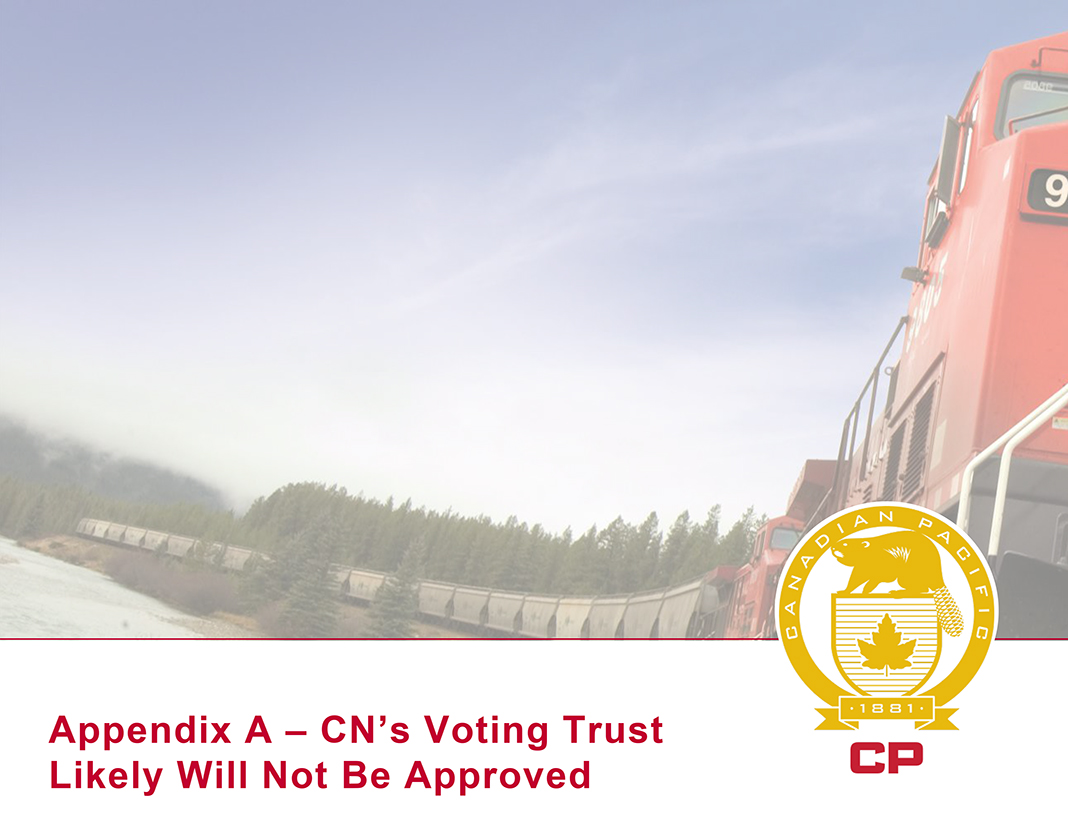
Appendix A – CN’s Voting Trust Likely Will Not Be Approved
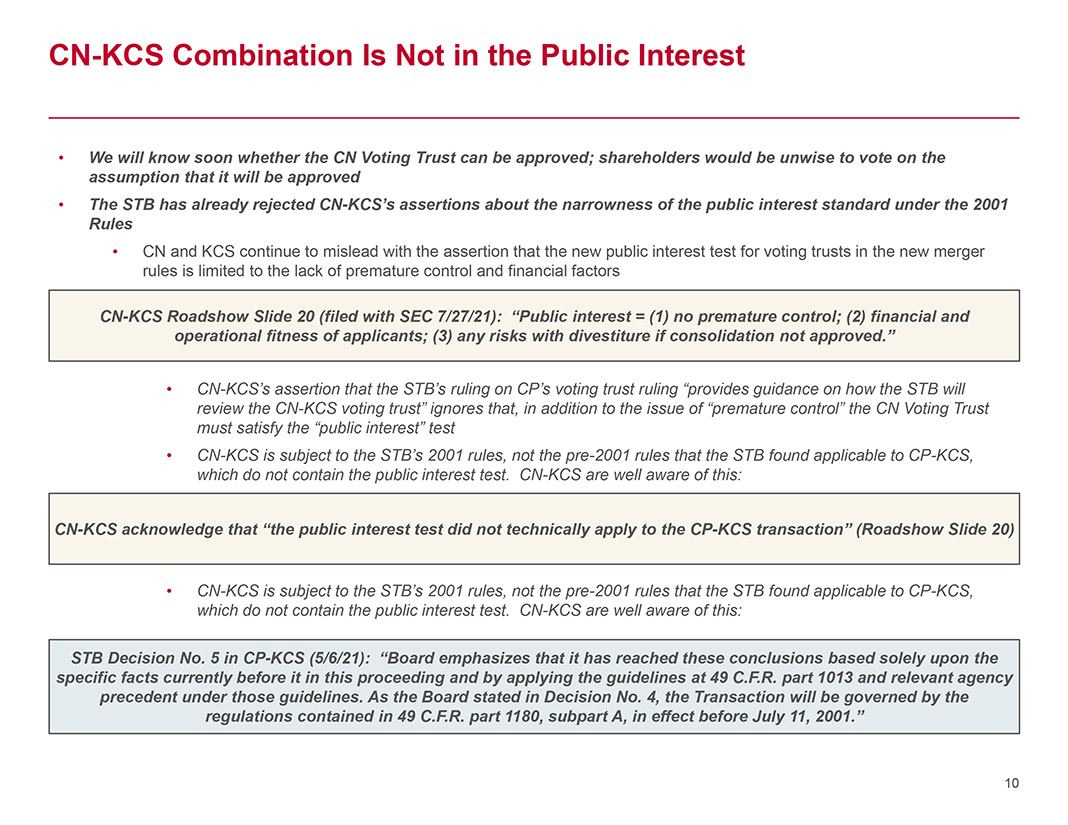
CN-KCS Combination Is Not in the Public Interest
• We will know soon whether the CN Voting Trust can be approved; shareholders would be unwise to vote on the assumption that it will be approved
• The STB has already rejected CN-KCS’s assertions about the narrowness of the public interest standard under the 2001 Rules
• CN and KCS continue to mislead with the assertion that the new public interest test for voting trusts in the new merger rules is limited to the lack of
premature control and financial factors
CN-KCS Roadshow Slide 20 (filed with SEC 7/27/21): “Public interest = (1) no
premature control; (2) financial and operational fitness of applicants; (3) any risks with divestiture if consolidation not approved.”
•
CN-KCS’s assertion that the STB’s ruling on CP’s voting trust ruling “provides guidance on how the STB will review the CN-KCS voting trust” ignores that, in addition to the issue of
“premature control” the CN Voting Trust must satisfy the “public interest” test
• CN-KCS is subject to the STB’s 2001 rules, not the pre-2001 rules that the STB found applicable to CP-KCS, which do not contain the public interest test. CN-KCS are well aware of this:
CN-KCS acknowledge that “the public interest test did not technically apply to the
CP-KCS transaction” (Roadshow Slide 20)
• CN-KCS is subject to the
STB’s 2001 rules, not the pre-2001 rules that the STB found applicable to CP-KCS, which do not contain the public interest test.
CN-KCS are well aware of this:
STB Decision No. 5 in CP-KCS (5/6/21):
“Board emphasizes that it has reached these conclusions based solely upon the specific facts currently before it in this proceeding and by applying the guidelines at 49 C.F.R. part 1013 and relevant agency precedent under those guidelines. As
the Board stated in Decision No. 4, the Transaction will be governed by the regulations contained in 49 C.F.R. part 1180, subpart A, in effect before July 11, 2001.”
10
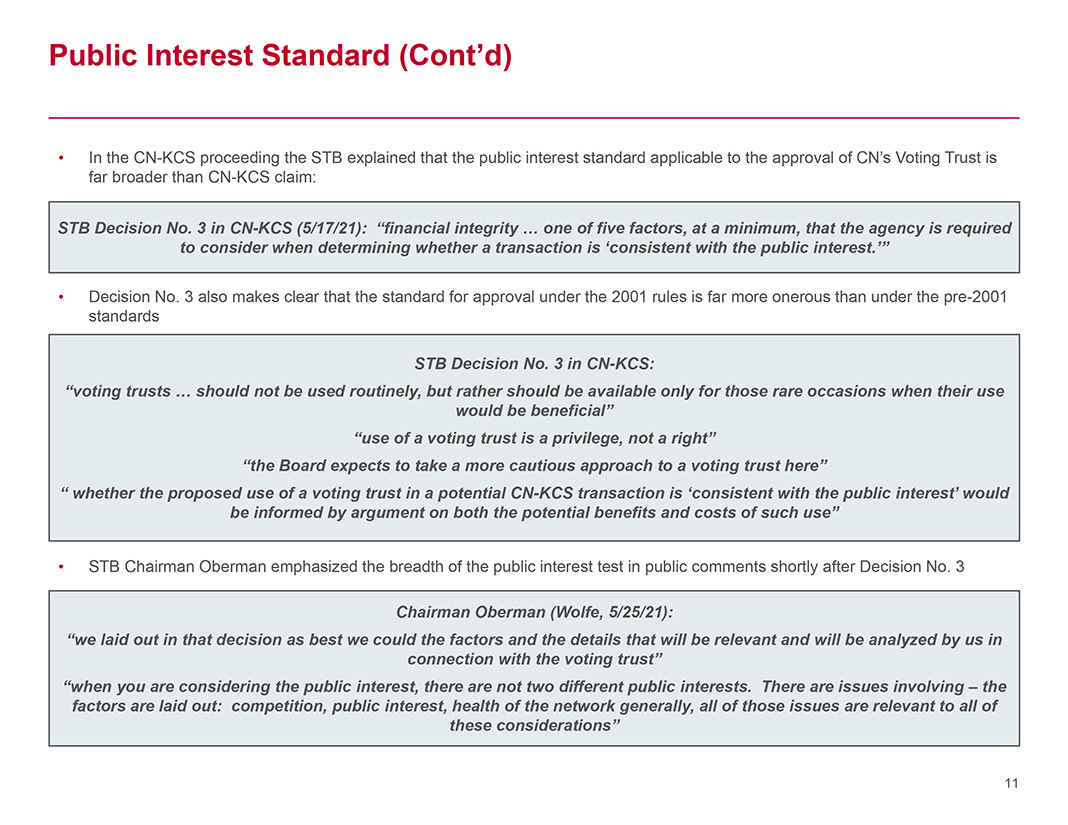
Public Interest Standard (Cont’d)
• In
the CN-KCS proceeding the STB explained that the public interest standard applicable to the approval of CN’s Voting Trust is far broader than CN-KCS claim:
STB Decision No. 3 in CN-KCS (5/17/21): “financial integrity … one of five factors, at a minimum, that the
agency is required to consider when determining whether a transaction is ‘consistent with the public interest.’”
• Decision No. 3 also
makes clear that the standard for approval under the 2001 rules is far more onerous than under the pre-2001 standards
STB
Decision No. 3 in CN-KCS:
“voting trusts … should not be used routinely, but rather should be available only
for those rare occasions when their use would be beneficial” “use of a voting trust is a privilege, not a right” “the Board expects to take a more cautious approach to a voting trust here” “ whether the proposed use of
a voting trust in a potential CN-KCS transaction is ‘consistent with the public interest’ would be informed by argument on both the potential benefits and costs of such use”
• STB Chairman Oberman emphasized the breadth of the public interest test in public comments shortly after Decision No. 3
Chairman Oberman (Wolfe, 5/25/21):
“we laid out in that decision as best we could the
factors and the details that will be relevant and will be analyzed by us in connection with the voting trust” “when you are considering the public interest, there are not two different public interests. There are issues involving –
the factors are laid out: competition, public interest, health of the network generally, all of those issues are relevant to all of these considerations”
11
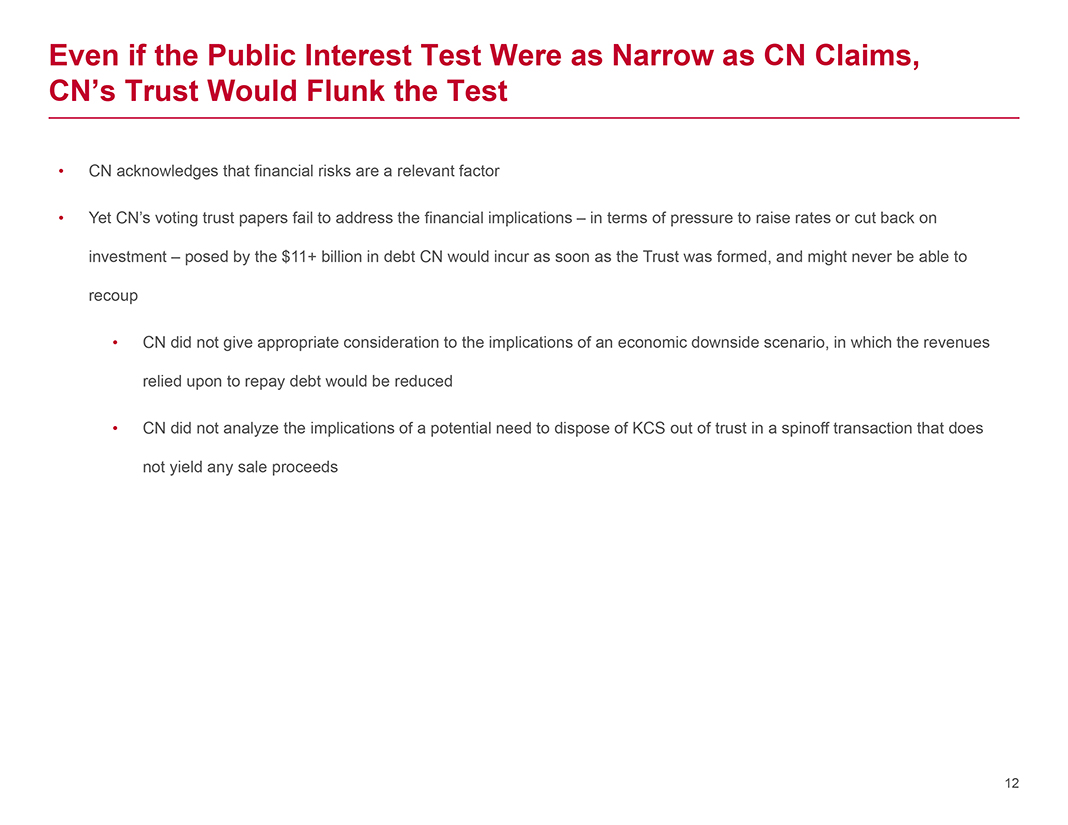
Even if the Public Interest Test Were as Narrow as CN Claims, CN’s Trust Would Flunk the Test
• CN acknowledges that financial risks are a relevant factor
• Yet CN’s voting
trust papers fail to address the financial implications – in terms of pressure to raise rates or cut back on investment – posed by the $11+ billion in debt CN would incur as soon as the Trust was formed, and might never be able to recoup
• CN did not give appropriate consideration to the implications of an economic downside scenario, in which the revenues relied upon to repay debt would be
reduced
• CN did not analyze the implications of a potential need to dispose of KCS out of trust in a spinoff transaction that does not yield any sale
proceeds
12
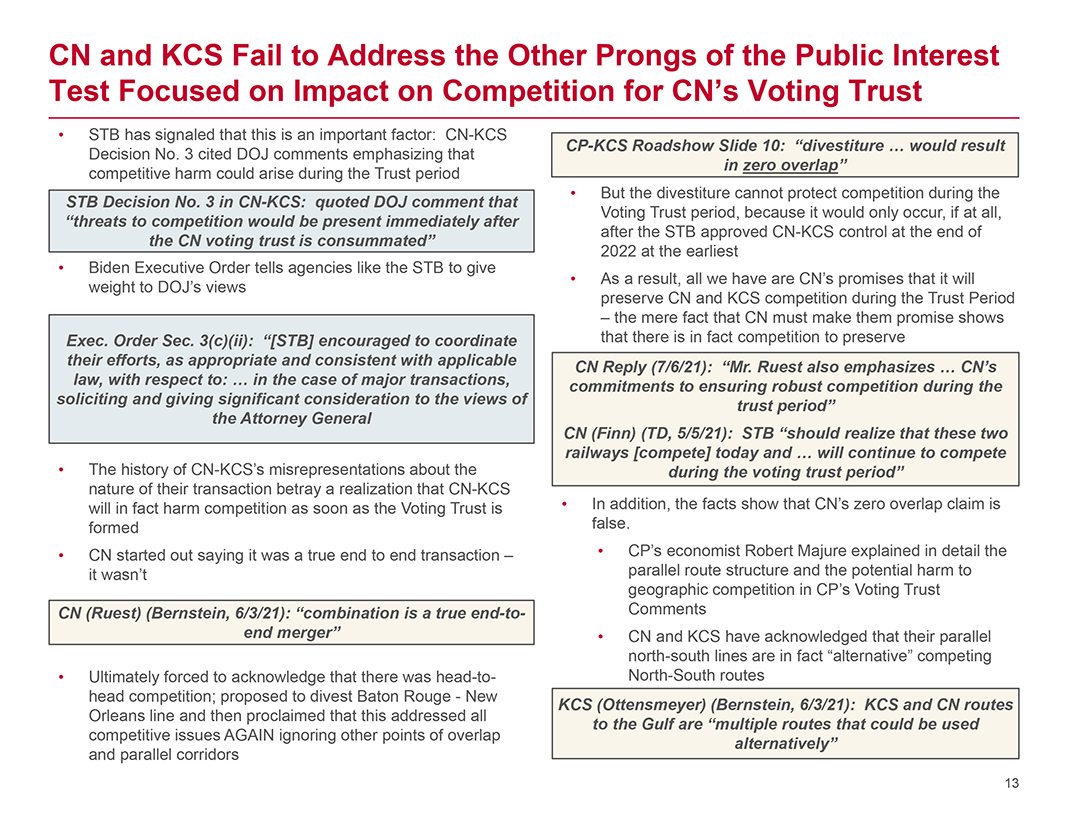
CN and KCS Fail to Address the Other Prongs of the Public Interest Test Focused on Impact on Competition for CN’s Voting Trust
• STB has signaled that this is an important factor: CN-KCS Decision No. 3 cited DOJ comments emphasizing that
competitive harm could arise during the Trust period
STB Decision No. 3 in CN-KCS: quoted DOJ comment that
“threats to competition would be present immediately after the CN voting trust is consummated”
• Biden Executive Order tells agencies like the STB
to give weight to DOJ’s views
Exec. Order Sec. 3(c)(ii): “[STB] encouraged to coordinate their efforts, as appropriate and consistent with applicable
law, with respect to: … in the case of major transactions, soliciting and giving significant consideration to the views of the Attorney General
• The
history of CN-KCS’s misrepresentations about the nature of their transaction betray a realization that CN-KCS will in fact harm competition as soon as the Voting
Trust is formed
• CN started out saying it was a true end to end transaction –it wasn’t
CN (Ruest) (Bernstein, 6/3/21): “combination is a true end-to-end merger”
• Ultimately forced to acknowledge that there was head-to-head competition; proposed to divest
Baton Rouge—New Orleans line and then proclaimed that this addressed all competitive issues AGAIN ignoring other points of overlap and parallel corridors
CP-KCS Roadshow Slide 10: “divestiture … would result in zero overlap”
• But the divestiture cannot protect
competition during the Voting Trust period, because it would only occur, if at all, after the STB approved CN-KCS control at the end of 2022 at the earliest
• As a result, all we have are CN’s promises that it will preserve CN and KCS competition during the Trust Period – the mere fact that CN must make them promise
shows that there is in fact competition to preserve
CN Reply (7/6/21): “Mr. Ruest also emphasizes … CN’s commitments to ensuring robust
competition during the trust period” CN (Finn) (TD, 5/5/21): STB “should realize that these two railways [compete] today and … will continue to compete during the voting trust period”
• In addition, the facts show that CN’s zero overlap claim is false.
•
CP’s economist Robert Majure explained in detail the parallel route structure and the potential harm to geographic competition in CP’s Voting Trust Comments
• CN and KCS have acknowledged that their parallel north-south lines are in fact “alternative” competing North-South routes
KCS (Ottensmeyer) (Bernstein, 6/3/21): KCS and CN routes to the Gulf are “multiple routes that could be used alternatively”
13
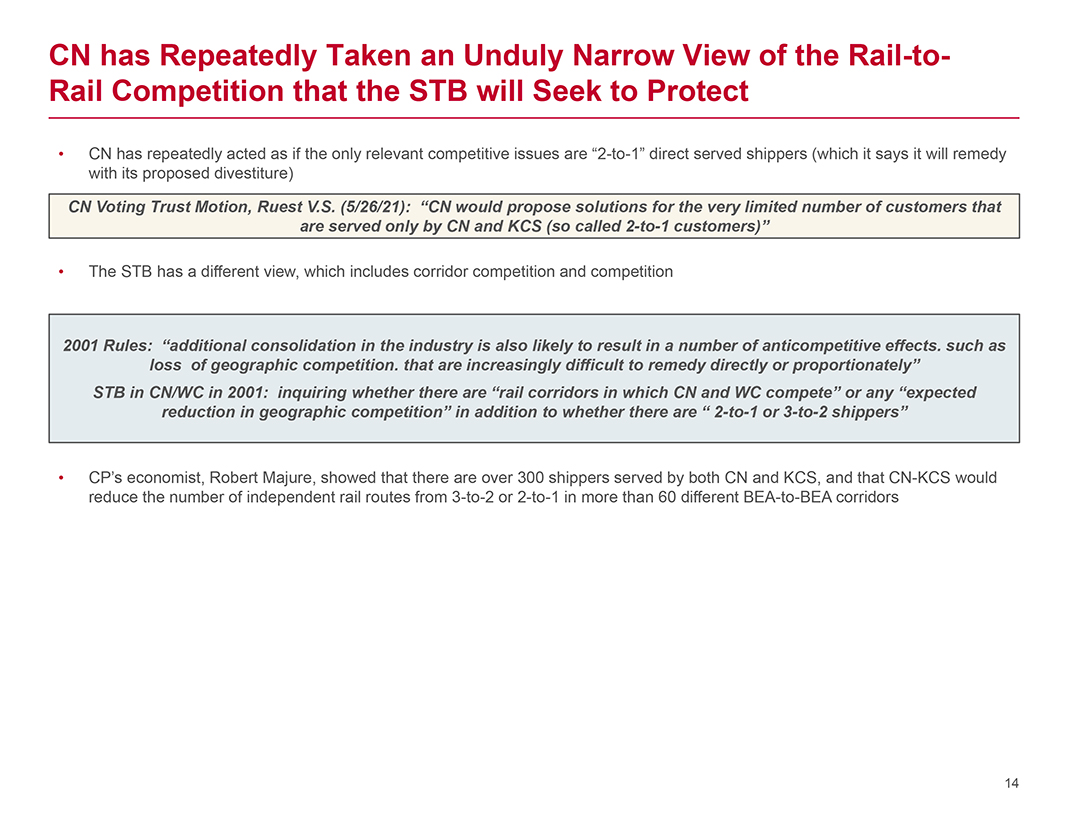
CN has Repeatedly Taken an Unduly Narrow View of the
Rail-to-Rail Competition that the STB will Seek to Protect
CN has repeatedly acted
as if the only relevant competitive issues are “2-to-1” direct served shippers (which it says it will remedy with its proposed divestiture)
CN Voting Trust Motion, Ruest V.S. (5/26/21): “CN would propose solutions for the very limited number of customers that are served only by CN and KCS (so called 2-to-1 customers)”
The STB has a different view, which includes corridor competition
and competition
2001 Rules: “additional consolidation in the industry is also likely to result in a number of anticompetitive effects. such as loss of
geographic competition. that are increasingly difficult to remedy directly or proportionately” STB in CN/WC in 2001: inquiring whether there are “rail corridors in which CN and WC compete” or any “expected reduction in geographic
competition” in addition to whether there are “ 2-to-1 or 3-to-2 shippers”
CP’s economist, Robert Majure, showed that there are over 300 shippers served by both CN and KCS, and that CN-KCS
would reduce the number of independent rail routes from 3-to-2 or 2-to-1 in more than 60
different BEA-to-BEA corridors
14
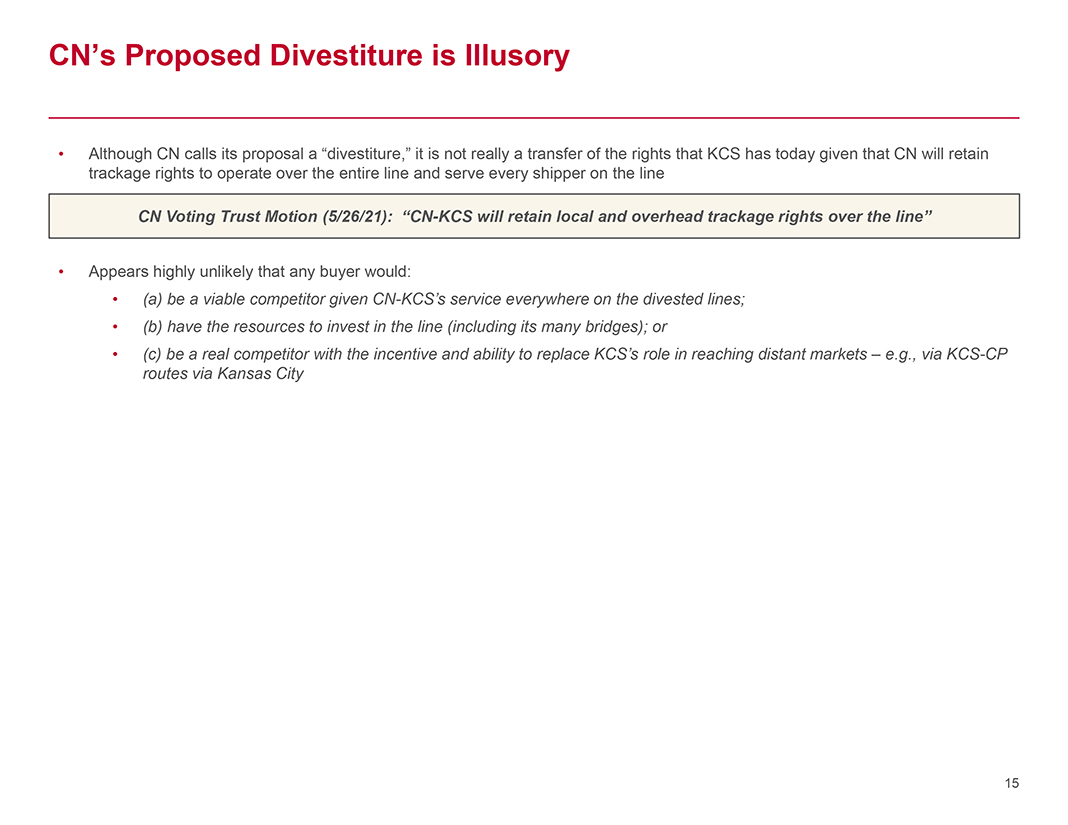
CN’s Proposed Divestiture is Illusory
Although CN calls its proposal a “divestiture,” it is not really a transfer of the rights that KCS has today given that CN will retain trackage rights to
operate over the entire line and serve every shipper on the line
CN Voting Trust Motion (5/26/21): “CN-KCS will retain
local and overhead trackage rights over the line”
Appears highly unlikely that any buyer would:
(a) be a viable competitor given CN-KCS’s service everywhere on the divested lines;
(b) have the resources to invest in the line (including its many bridges); or
(c) be a real
competitor with the incentive and ability to replace KCS’s role in reaching distant markets – e.g., via KCS-CP routes via Kansas City
15
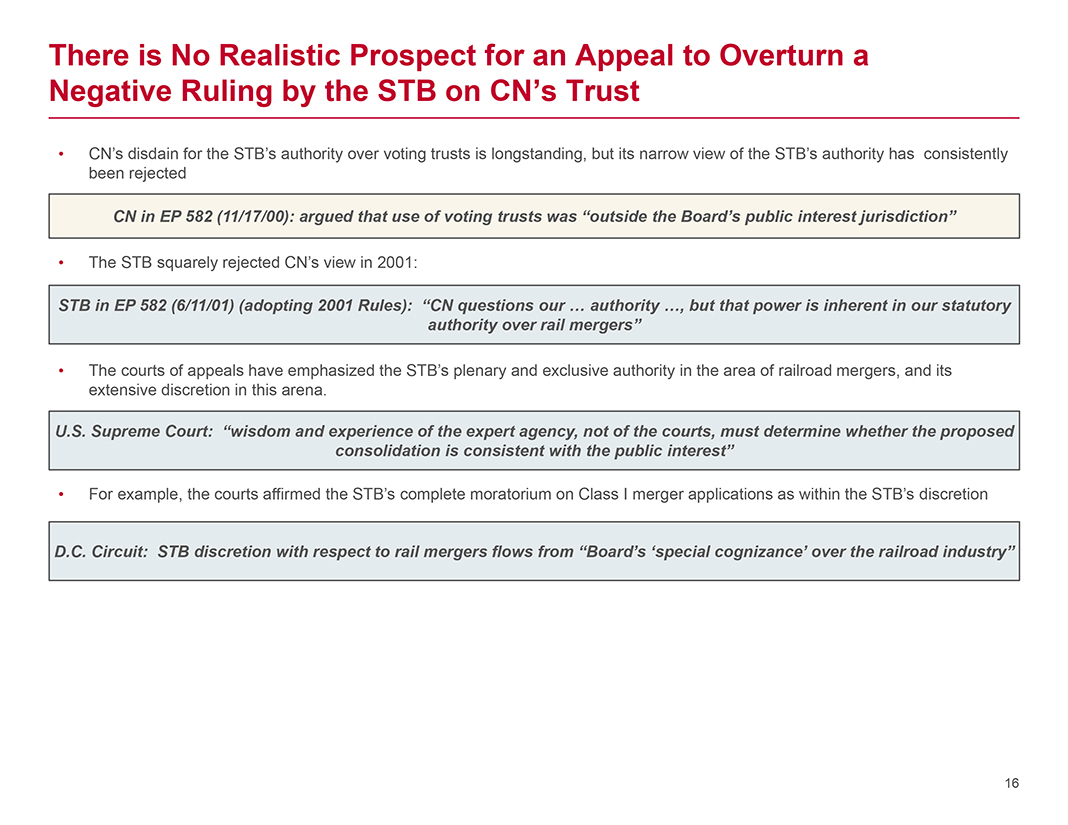
There is No Realistic Prospect for an Appeal to Overturn a Negative Ruling by the STB on CN’s Trust
CN’s disdain for the STB’s authority over voting trusts is longstanding, but its narrow view of the STB’s authority has consistently been rejected
CN in EP 582 (11/17/00): argued that use of voting trusts was “outside the Board’s public interest jurisdiction”
The STB squarely rejected CN’s view in 2001:
STB in EP 582 (6/11/01) (adopting 2001
Rules): “CN questions our … authority …, but that power is inherent in our statutory authority over rail mergers”
The courts of appeals have
emphasized the STB’s plenary and exclusive authority in the area of railroad mergers, and its extensive discretion in this arena.
U.S. Supreme Court:
“wisdom and experience of the expert agency, not of the courts, must determine whether the proposed consolidation is consistent with the public interest”
For example, the courts affirmed the STB’s complete moratorium on Class I merger applications as within the STB’s discretion
D.C. Circuit: STB discretion with respect to rail mergers flows from “Board’s ‘special cognizance’ over the railroad industry”
16
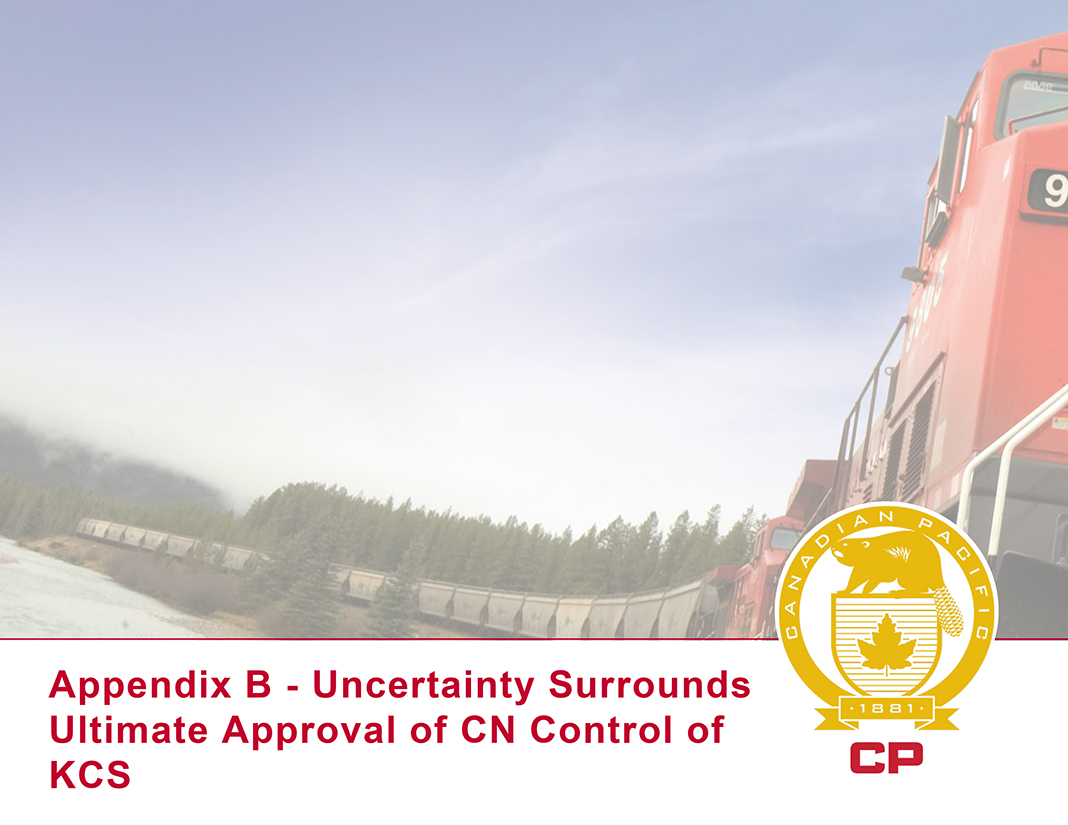
Appendix B—Uncertainty Surrounds Ultimate Approval of CN Control of KCS
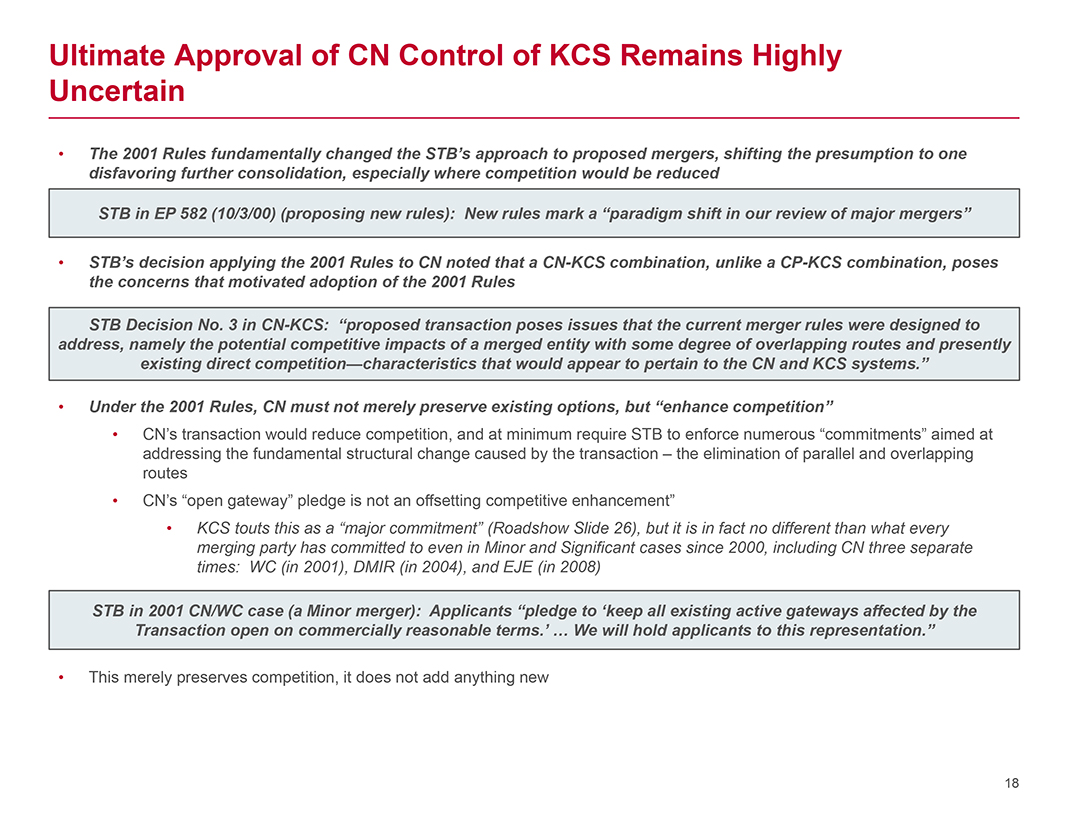
Ultimate Approval of CN Control of KCS Remains Highly Uncertain
The 2001 Rules fundamentally changed the STB’s approach to proposed mergers, shifting the presumption to one disfavoring further consolidation, especially where competition
would be reduced
STB in EP 582 (10/3/00) (proposing new rules): New rules mark a “paradigm shift in our review of major mergers”
STB’s decision applying the 2001 Rules to CN noted that a CN-KCS combination, unlike a
CP-KCS combination, poses the concerns that motivated adoption of the 2001 Rules
STB Decision No. 3 in CN-KCS: “proposed transaction poses issues that the current merger rules were designed to address, namely
the potential competitive impacts of a merged entity with some degree of overlapping routes and presently existing direct competition—characteristics that would appear to pertain to the CN and KCS systems.”
Under the 2001 Rules, CN must not merely preserve existing options, but “enhance competition”
CN’s transaction would reduce competition, and at minimum require STB to enforce numerous “commitments” aimed at addressing the fundamental structural change caused
by the transaction – the elimination of parallel and overlapping routes
CN’s “open gateway” pledge is not an offsetting competitive
enhancement”
KCS touts this as a “major commitment” (Roadshow Slide 26), but it is in fact no different than what every merging party has committed
to even in Minor and Significant cases since 2000, including CN three separate times: WC (in 2001), DMIR (in 2004), and EJE (in 2008)
STB in 2001 CN/WC case (a
Minor merger): Applicants “pledge to ‘keep all existing active gateways affected by the Transaction open on commercially reasonable terms.’ … We will hold applicants to this representation.”
This merely preserves competition, it does not add anything new
18
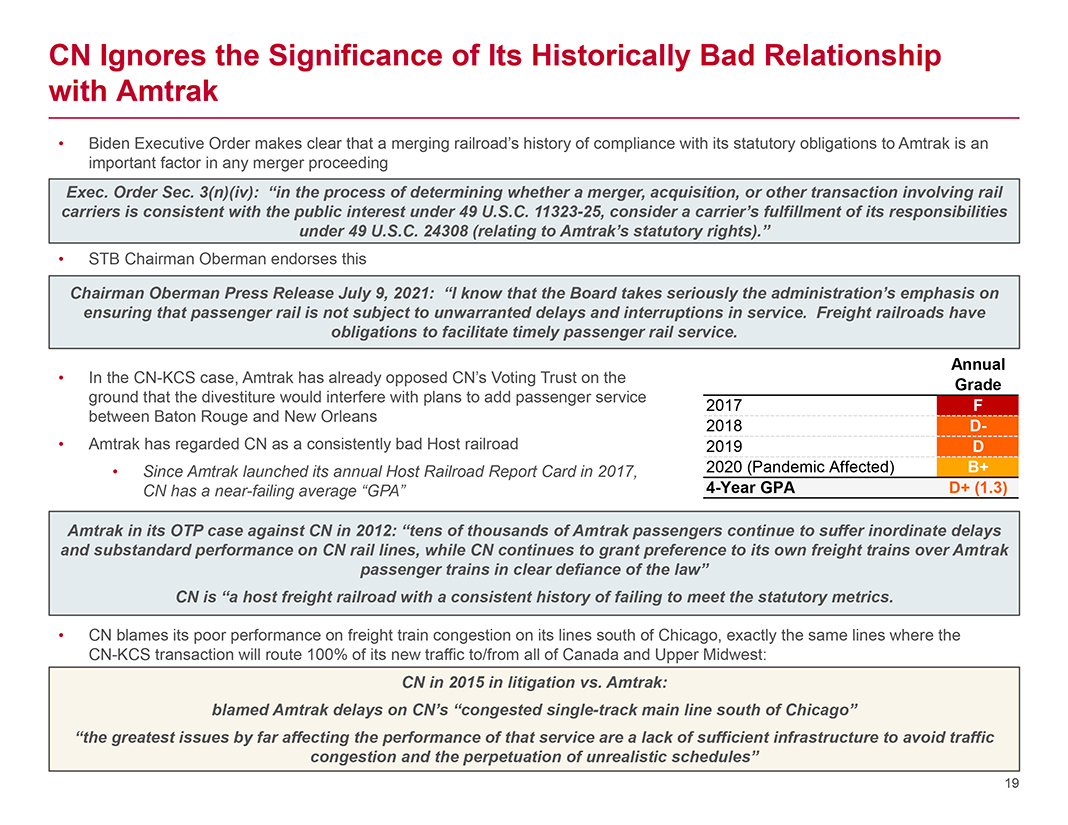
CN Ignores the Significance of Its Historically Bad Relationship with Amtrak
Biden Executive Order makes clear that a merging railroad’s history of compliance with its statutory obligations to Amtrak is an important factor in any merger proceeding
Exec. Order Sec. 3(n)(iv): “in the process of determining whether a merger, acquisition, or other transaction involving rail carriers is consistent with the
public interest under 49 U.S.C. 11323-25, consider a carrier’s fulfillment of its responsibilities under 49 U.S.C. 24308 (relating to Amtrak’s statutory rights).”
STB Chairman Oberman endorses this
Chairman Oberman Press Release July 9, 2021: “I
know that the Board takes seriously the administration’s emphasis on ensuring that passenger rail is not subject to unwarranted delays and interruptions in service. Freight railroads have obligations to
facilitate timely passenger rail service.
In the
CN-KCS case, Amtrak has already opposed CN’s Voting Trust on the ground that the divestiture would interfere with plans to add passenger service between Baton Rouge and New Orleans
Amtrak has regarded CN as a consistently bad Host railroad
Since Amtrak launched its annual
Host Railroad Report Card in 2017, CN has a near-failing average “GPA”
Annual Grade
2017 F 2018 D-2019 D 2020 (Pandemic Affected) B+ 4-Year GPA D+ (1.3)
Amtrak in its OTP case against CN in 2012: “tens of thousands of Amtrak passengers continue to suffer inordinate delays and substandard performance on CN rail lines, while CN
continues to grant preference to its own freight trains over Amtrak passenger trains in clear defiance of the law” CN is “a host freight railroad with a consistent history of failing to meet the statutory metrics.
CN blames its poor performance on freight train congestion on its lines south of Chicago, exactly the same lines where the CN-KCS
transaction will route 100% of its new traffic to/from all of Canada and Upper Midwest:
CN in 2015 in litigation vs. Amtrak: blamed Amtrak delays on CN’s
“congested single-track main line south of Chicago”
“the greatest issues by far affecting the performance of that service are a lack of sufficient
infrastructure to avoid traffic congestion and the perpetuation of unrealistic schedules”
19
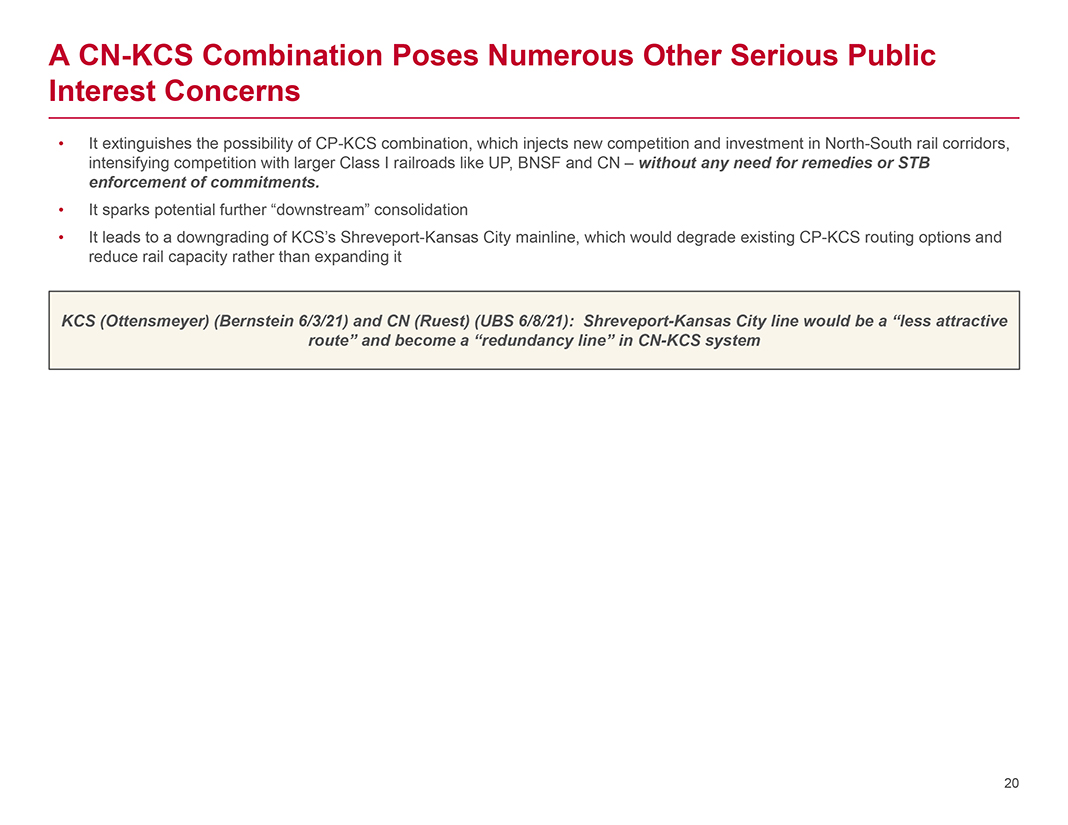
A CN-KCS Combination Poses Numerous Other Serious Public Interest Concerns
It extinguishes the possibility of CP-KCS combination, which injects new competition and investment in North-South rail corridors,
intensifying competition with larger Class I railroads like UP, BNSF and CN – without any need for remedies or STB enforcement of commitments.
It sparks
potential further “downstream” consolidation
It leads to a downgrading of KCS’s Shreveport-Kansas City mainline, which would degrade existing CP-KCS routing options and reduce rail capacity rather than expanding it
KCS (Ottensmeyer) (Bernstein 6/3/21) and CN (Ruest) (UBS
6/8/21): Shreveport-Kansas
City line would be a “less attractive route” and become a “redundancy line” in
CN-KCS system
20
Serious News for Serious Traders! Try StreetInsider.com Premium Free!
You May Also Be Interested In
- Umicore secures € 499 million in sustainability-linked private debt placement
- AKVA group ASA: Invitation – presentation of the Q1 2024 financial results
- Albion Technology & General VCT PLC: Annual Financial Report
Create E-mail Alert Related Categories
SEC FilingsSign up for StreetInsider Free!
Receive full access to all new and archived articles, unlimited portfolio tracking, e-mail alerts, custom newswires and RSS feeds - and more!



 Tweet
Tweet Share
Share